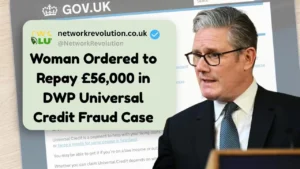In one of the most significant welfare updates of 2025, the Department for Work and Pensions (DWP) has unveiled a 13-week transitional protection rule for claimants of Personal Independence Payment (PIP) and Universal Credit (UC). The measure, introduced as part of wider welfare reforms designed to save £5 billion, aims to prevent households from facing sudden income loss after a benefits reassessment. It’s a move many charities describe as “a step toward fairness,” though critics warn it’s a temporary fix to a deeper problem.

Introduction to the New 13-Week Rule
Under the new rule, claimants who lose eligibility for the PIP daily living component will continue to receive that payment for up to 13 weeks after their reassessment.
This transitional period gives claimants extra time to:

- Appeal a decision or request a review.
- Adjust financially to reduced income.
- Preserve related benefits, such as Carer’s Allowance or the carer’s element of Universal Credit.
Previously, support stopped immediately after an adverse decision — a policy that often left households without any income bridge.

“This reform acknowledges that reassessment shouldn’t mean instant destitution,” said Dr. Paul Johnson, Director at the Institute for Fiscal Studies (IFS). “The 13-week cushion gives people a fair chance to challenge decisions and plan ahead.”

Key Features and Overview
| Feature | Previous Policy | New 2025 Policy (13-Week Rule) |
|---|---|---|
| PIP Daily Living Component | Ended immediately after reassessment | Continues for 13 weeks after loss |
| Linked Benefits (e.g., Carer’s Allowance, UC Carer’s Element) | Terminated as soon as PIP ended | Continue during the 13-week transition |
| Appeals and Reassessments | Claimants often had no income during appeals | Time provided to request reconsideration |
| Goal of Policy | Cost reduction through quick removal | Balanced reform with protection period |
| Duration of Transitional Support | 0 weeks | 13 weeks |
Eligibility and Who Is Affected?
The rule applies to:
- PIP claimants who lose entitlement to the daily living component after reassessment.
- Carers receiving Carer’s Allowance or the carer’s element of Universal Credit linked to the claimant.

You qualify for the 13-week protection if:
- You were receiving the PIP daily living component at the time of reassessment.
- Your entitlement ends due to a change in medical assessment or decision revision.
- You are receiving related benefits that depend on your PIP entitlement.
During this time, payments will continue automatically — there is no need to reapply.
How the Rule Works in Practice?
When a claimant is reassessed and loses PIP daily living eligibility, the DWP will automatically apply the 13-week extension.
This grace period ensures continuity for both the individual and their carer.
Example Scenario:
- A claimant loses PIP daily living entitlement after reassessment on 1 February 2025.
- Under the new rule, they will continue to receive payments until 1 May 2025.
- During that time, their Carer’s Allowance and UC carer’s element will also remain active.
- If the decision is overturned on appeal, payments continue without interruption.
This approach provides stability and predictability — two things that were missing under previous reforms.
Impact on Carers and Families
The DWP confirmed that the 13-week rule extends to linked benefits, ensuring carers aren’t immediately penalized when PIP eligibility changes.
For carers, this means:
- Carer’s Allowance remains in payment for 13 weeks.
- The carer’s element of Universal Credit continues for the same duration.
- The extra time allows families to reorganize finances or appeal decisions without losing multiple income streams simultaneously.
“It’s a relief for carers who often face the hardest cuts first,” said Helen Walker, Chief Executive of Carers UK. “This buffer gives families a little more time to breathe, plan, and make decisions.”
Comparison With Previous Transitions
The last major welfare transition — from Disability Living Allowance (DLA) to PIP — drew widespread criticism for abrupt benefit stops. Many households fell into hardship overnight when payments ended following reassessment.
The new 13-week rule is designed to prevent a repeat of that mistake.
| Transition Period | Previous System (DLA–PIP) | New 13-Week Rule (PIP–UC) |
|---|---|---|
| Notice Period | None or short | 13 weeks of continued support |
| Linked Benefits | Ended immediately | Continue for 13 weeks |
| Public Reaction | Strongly negative | Mixed but generally positive |
| Hardship Impact | High risk of debt or arrears | Reduced financial shock |
“The DWP seems to have learned from past backlash,” commented Faye Goldman, policy analyst at Turn2us. “It’s still not perfect, but it’s a tangible improvement for those most at risk.”
Financial and Administrative Impact
While the DWP projects around £5 billion in overall welfare savings, this rule represents a targeted reinvestment in transitional protection.
The estimated cost of maintaining the 13-week buffer is £120–150 million annually, according to internal forecasts — a small price compared to the cost of managing crisis-level poverty or appeals surges.
Expected Outcomes:
- Reduced appeals stress: Claimants are less likely to experience immediate hardship, allowing smoother case management.
- Improved public perception: Seen as a fairer and more humane approach to welfare reform.
- Streamlined processing: Fewer emergency payments or hardship loans needed.
Why the 13-Week Rule Matters?
The policy embodies a shift in welfare philosophy — from abrupt austerity to managed transition. It reflects a recognition that administrative changes shouldn’t destabilize those already facing health and income challenges.
For claimants, it provides:
- Time to gather medical evidence.
- Stability for dependents and carers.
- A sense of control during uncertainty.
“This kind of transitional support acknowledges the real-life impact of reassessments,” said Professor Jane Millar, social policy expert at the University of Bath. “It’s about dignity and continuity in a system often criticised for its rigidity.”
Recent Developments and Political Context
The 13-week rule is part of the DWP’s 2025–26 welfare reform strategy, alongside stricter eligibility reviews and digital claims processing.
Ministers have described it as part of a “new social contract” — balancing compassion with cost control.
However, opposition MPs and disability advocates warn that the buffer is temporary relief within a broader tightening of disability benefits.
The government maintains that no one will see an immediate cut in income, but campaigners argue the long-term trajectory still risks increasing poverty rates among disabled households.
FAQs
What is the DWP 13-week rule?
It’s a transitional protection rule allowing PIP daily living payments (and linked benefits) to continue for 13 weeks after a claimant is reassessed and loses entitlement.
Does it apply to both PIP and Universal Credit?
Yes. The rule protects PIP payments and ensures that related benefits like Carer’s Allowance and UC’s carer element continue temporarily.
Do I need to apply for the 13-week extension?
No. It’s automatic for eligible claimants once a decision to end PIP daily living is made.
What happens after the 13 weeks?
If you haven’t successfully appealed or reapplied, payments will stop. Linked benefits will also end.
Will this delay affect other benefit reviews?
No. The 13-week period is solely for transitional support — normal reassessment schedules continue.
Is there any impact on backdated appeals?
If your appeal succeeds, the DWP will restore payments retrospectively, ensuring no loss for the transition period.

